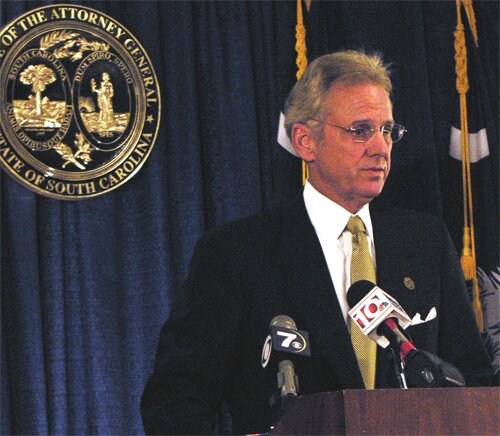
|
Attorney General Henry McMaster
|
Today's News
U.S. Supreme Court Clears
Way For Water War Case
Columbia, S.C. – The United States Supreme Court today took a major step toward hearing the ongoing water dispute between South Carolina and North Carolina.
Despite an effort to head off a massive legal battle between the two states over North Carolina’s diversion of water from the Catawba River, South Carolina Attorney General Henry McMaster asked the United States Supreme Court in June to hear the dispute in its original jurisdiction.
Today, the Supreme Court issued an order granting South Carolina’s motion to file that complaint, and required North Carolina to respond within thirty (30) days. The order is available online:
http://www.supremecourtus.gov/orders/courtorders/100107pzor.pdf
In South Carolina’s complaint, McMaster argues that North Carolina’s Environmental Management Commission (EMC) ran afoul of the U.S. Constitution’s doctrine of Equitable Apportionment when it ignored the interests and needs of South Carolina by permitting large amounts of the Catawba River to be diverted upstream of its neighboring state. Under the Constitution, each state is a coequal sovereign and is entitled to equal status and treatment with respect to interstate rivers.
In 2006, McMaster announced the state’s official legal opposition to an interbasin water transfer (IBT) from the North Carolina towns of Concord and Kannapolis. The IBT will remove vast quantities of water from the Catawba River basin upstream from South Carolina, and return it, once used, into the Pee Dee River Basin.
The implications for communities downstream in South Carolina sparked concern from local, state and federal officials. Both Governor Mark Sanford and the S.C. Legislature expressed their opposition to the plan, as did U.S. Representatives John Spratt and James Clyburn.
In a December 2006 letter to N.C. Attorney General Roy Cooper, McMaster outlined South Carolina’s opposition to the proposed IBT, and specifically questioned the authority of the N.C. Environmental Management Commission to decide such issues with limited or no input at all from South Carolina. That commission issued its decision permitting the IBT in January 2007.
McMaster proposed an Interstate Compact between the two states to avoid a massive legal battle, but that proposal was not accepted by North Carolina. McMaster stated in the same letter that without such an agreement, South Carolina would be forced to file a lawsuit asking the United States Supreme Court to block North Carolina’s plans for the Catawba River.
Online Resources:
Application of the State of South Carolina for a Preliminary Injunction
http://www.scattorneygeneral.com/newsroom/pdf/water_preliminaryapp.pdf
Affidavits from Concerned Parties
http://www.scattorneygeneral.com/newsroom/pdf/water_catawbaaffidavits.pdf
Motion of the State of South Carolina for Leave to File Complaint, Complaint, and Brief
http://www.scattorneygeneral.com/newsroom/pdf/water_motion.pdf

